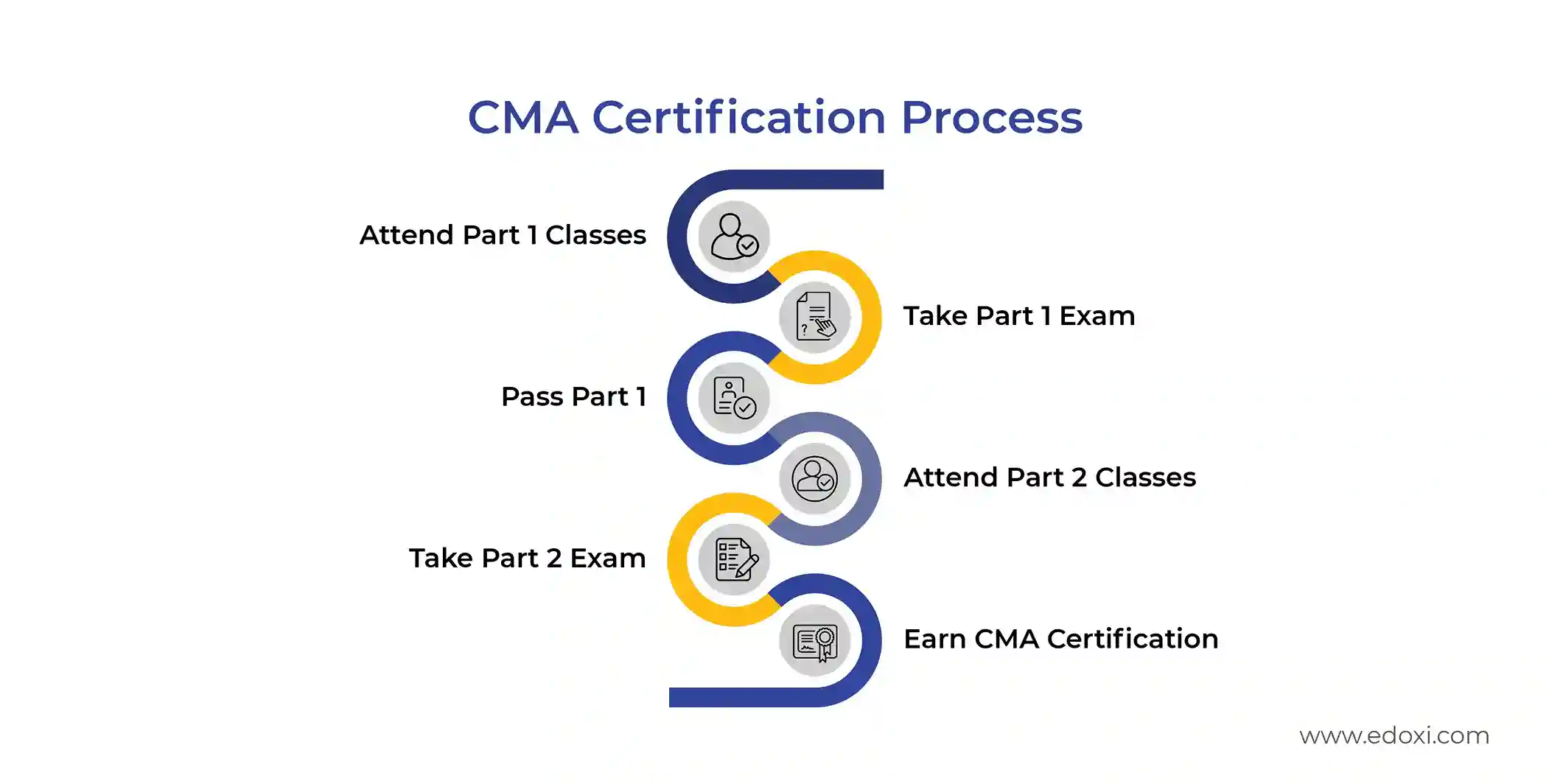The Certified Management Accountant (CMA) Course will build your knowledge in financial accounting, financial planning, management accounting, risk management, internal controls, and decision-making. Edoxi’s 120-hour CMA Course is designed to help professionals excel in global accounting and financial management.
The CMA certification is highly valued across all industries globally. Our KHDA-approved CMA Course in Dubai equips you with the essential skills and knowledge needed to advance in Dubai’s diverse and competitive sectors. The CMA Course is delivered in a small group setting with a maximum of 10 students. This format encourages interactive discussions, collaborative learning, and practical problem-solving exercises. You will benefit from real-time feedback, expert guidance, and access to all necessary study materials to ensure effective preparation for the CMA exam.
For learners who prefer flexibility, our Live Online Training delivers the same 120-hour comprehensive curriculum in a virtual format. For organisations, we also offer Corporate Training tailored to meet the unique needs of organisations. This 8-day intensive program can be customised to align with specific corporate goals and is delivered through a collaborative group learning approach. Expert-led sessions combine CMA exam preparation with real-world case studies. In addition, we offer training at selected hotels, client locations, or Edoxi.
Earning your CMA certification is a step-by-step journey that builds your expertise in financial management and strategic accounting. Edoxi’s CMA Course in Dubai will prepare you for the CMA Certification exam. The CMA Exam is divided into two parts, and candidates must successfully pass both to earn the certification.
You'll begin with Part 1, where you'll attend classes to develop a strong foundation in financial management and accounting principles. Part 1 focuses on the following key areas like External Financial Reporting Decisions, Planning, Budgeting, Forecasting, Performance Management, Cost Management, Internal Controls, and Technology and Analytics. Once you've completed your coursework, you will take the Part 1 exam. Upon passing Part 1, participants advance to Part 2.

The image illustrates the CMA certification Process
In Part 2, you will dive deeper into advanced management accounting and decision-making strategies. Part 2 covers topics such as Financial Statement Analysis, Corporate Finance, Decision Analysis, Risk Management, Investment Decisions, and Professional Ethics. After completing your classes, you'll sit for the Part 2 exam to showcase your knowledge. Passing both exams is your key to earning the prestigious CMA certification, proving your skills and expertise on a global scale.
The Certified Management Accountant (CMA) Exam is a prestigious and globally recognised certification. CMA is offered by the Institute of Management Accountants (IMA). The following table provides an overview of the CMA Certification exam.
| Exam Criteria | Details |
| Exam Format | Two parts, 4 hours each (3 hours MCQ + 1-hour essays). |
| Questions | Each part includes 100 multiple-choice questions and 2 essay questions. |
| Passing Score | Candidates must score 360 out of 500 on Part 1 to proceed to Part 2 and also on Part 2 to earn certification. |
| Prerequisites | Bachelor's degree or professional qualification and IMA membership. |
| Certification Validity | Lifetime (with ongoing CPE requirements). |
| Recertification | 30 hours annual CPE, including 2 hours of ethics training. |
You will gain access to CMA guides, textbooks, mock exams, and extensive practice test banks to master exam content.
You will engage in collaborative group discussions and hands-on problem-solving exercises.
You get to tackle multiple-choice questions and essay simulations tailored to match CMA examination standards and requirements.
You will get access to professional-grade templates, frameworks, and specialised e-books to deepen your understanding.
You will learn in a small-batch environment, ensuring personalised guidance and an enhanced educational experience.
You can choose from flexible classroom or online sessions, with weekend timings that accommodate your work-life balance.
Ideal for recent graduates and students seeking a globally recognized CMA certification.
Effective for Professionals aiming to enhance their financial leadership capabilities and implement effective strategies.
Perfect for business owners looking to adopt advanced financial strategies, improve decision-making, and drive sustainable business growth.
Tailored for analysts wanting to deepen their knowledge of financial analysis and transition into strategic financial management roles.
Suited for professionals specializing in cost management who wish to enhance their skills and unlock greater career opportunities.
Ideal for individuals looking to advance into senior leadership roles in financial management and strategic decision-making.
Edoxi’s CMA training focuses on interactive and practical learning through structured group discussions and targeted exam preparation exercises. You will gain hands-on experience solving real-world financial problems.
You will participate in group discussions to analyse and explore key financial concepts.
You will practice essay questions and multiple-choice questions aligned with CMA exam standards.
You will engage in problem-solving exercises to strengthen your financial analysis and decision-making skills.
You will access detailed study guides, mock exams, e-books and additional resources for thorough exam preparation.
The CMA certification helps in significant career progression in the financial management field. The CMA Course also prepares you for diverse roles across industries. Here are the training outcomes after completing a CMA course in Dubai:

Get expert assistance in getting your CMA Course customised!
Here’s a four-step guide to becoming a certified CMA professional.
Join Edoxi’s CMA Course
Here are a few reasons why you should choose Edoxi for CMA Course in Dubai;
You get to study at a KHDA-Licensed institute in Dubai. This ensures professional education standards.
We provide insights from finance professionals who provide practical strategies for mastering CMA exam concepts.
You will get access detailed study guides, textbooks, mock exams, and test banks for CMA exam preparation.
Our training is held in small group sizes of up to 10 students. This ensures you receive personalized attention.
You will participate in discussions and problem-solving activities that enhance financial analysis and accounting skills.
We offer weekend classes to help you balance professional commitments with effective CMA preparation.

Our mentors are leaders and experts in their fields. They can challenge and guide you on your road to success!

Lahiru Prasanna Silva
Lahiru Prasanna Silva is an expert CMA trainer at Edoxi Training Institute, Dubai. He has over 20 years of practical experience in the finance industry and 18 years of dedicated training expertise.Throughout his career, he has successfully trained more than 20,000 students, equipping them with the skills and knowledge needed to excel in their professional journeys.
His deep understanding of finance and passion for teaching have made him a trusted mentor for aspiring CMA candidates.With a special interest in teaching, Lahiru combines his core expertise in education with his extensive finance background to deliver comprehensive training programs. His commitment to student success ensures that participants gain both theoretical knowledge and practical insights, enabling them to excel in their CMA certification exams and build successful careers in financial management.
Here is the list of other major locations where Edoxi offers CMA Certification Course